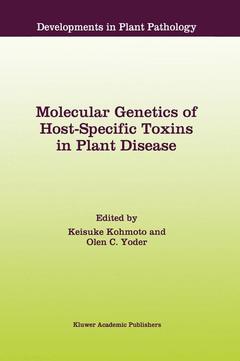Description
Molecular Genetics of Host-Specific Toxins in Plant Disease, Softcover reprint of the original 1st ed. 1998
Proceedings of the 3rd Tottori International Symposium on Host-Specific Toxins, Daisen, Tottori, Japan, August 24–29, 1997
Developments in Plant Pathology Series, Vol. 13
Coordinators: Kohmoto Keisuke, Yoder Olen C.
Language: English
Subject for Molecular Genetics of Host-Specific Toxins in Plant Disease:
Keywords
Pathogene; biotechnology; degradation; detoxification; pathogen; physiology
Publication date: 10-2012
415 p. · 16x24 cm · Paperback
415 p. · 16x24 cm · Paperback
Description
/li>Contents
/li>Comment
/li>
For investigators engaged in the study of toxins generally, and host-specific toxins in particular, it is a rare treat to attend a meeting in which toxins involved in plant pathogenesis are emphasized. A gathering of this type provides opportunity to consider the discovery of new toxins, their chemical structures, genes encoding enzymes that control their biosyntheses, their sites of action and physiological effects on plants, and their roles (if any) in pathological processes. Having acknowledged the inspiration fostered by a 'toxin meeting', however, it is important to point out that the program of this symposium was generously sprinkled with 'nontoxin' talks. These contributions generated cross-disciplinary discussion and promoted new ways of thinking about relationships among factors required for plant disease development. The point can be illustrated by considering just one example. We have in the past often regarded diseases mediated by host-specific toxins and diseases involving 'gene-for-gene' relationships as representing two different classes of fungal/plant interaction. This is largely because the key molecular recognition event in so-called 'toxin' diseases leads to compatibility, whereas the corresponding event in 'gene-for-gene' diseases leads to incompatibility. Yet the race specific elicitors produced by the 'gene-for-gene' fungi Cladosporium fulvum (De Wit, Adv. Bot. Res. 21:147- 185, 1995) and Rhynchosporium secalis (Rohe et a1. , EMBO J.
Toxin Biosynthesis. Effects of Toxins on Plants. Evolution and the Genetics of Toxin Production and Pathogenesis. Sensing, Penetration and Host Degradation. Mechanisms of Plant Resistance and Susceptibility.
The Tottori International Symposia on Host-Specific Toxins were established in 1988 by the Tottori University Faculty of Agriculture to provide an interdisciplinary forum for scientists working in rapidly emerging areas of studies of plant--fungal pathogen interactions, especially involving host-specific toxins and related pathogenicity factors. Molecular Genetics of Host-Specific Toxins in Plant Disease is the proceedings of the 3rd international symposium on host-specific toxins held in August 1997 in Tottori, Japan. Up-to-date material is presented in rapidly developing research areas such as new toxins, fungal genes for toxin biosynthesis, evolution of pathogenic strategies, toxin actions on plants, toxin receptors, signal transduction, oxidative burst, mechanisms of sensing, penetrati
© 2024 LAVOISIER S.A.S.

